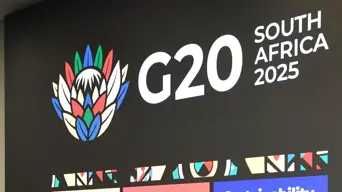Thought leaders caution against tensions between states overshadowing G20 priorities
Political analyst Dirk Kotze said the G20 policy agenda needs to adapt to the changing patterns of power to avoid further clashes in policy priorities.

Picture: @g20org/X
JOHANNESBURG - Thought leaders at the University of South Africa (UNISA) have warned that a lack of global credibility for the G20 grouping could impact the bloc's priorities if tensions between member states overshadow talks.
UNISA kicked off the first of a series of town hall discussions to be held across the country in the build-up to the G20 leaders’ summit at the end of the year.
The increasingly complicated geopolitical landscape is expected to test South Africa’s ability to navigate global fault lines.
UNISA’s Vice-Chancellor, Puleng LenkaBula, said the global system is under tremendous pressure, with the tensions between Washington and Pretoria adding to challenges.
“It’s not yet clear if the next country that should take over the G20 Presidency will even attend the summit. That’s one of the simple questions.”
Political analyst Dirk Kotze said the G20 policy agenda needs to adapt to the changing patterns of power to avoid further clashes in policy priorities.
“And I think this is the issue in G20, and I think it’s also the issue in BRICS, that there are new emerging powers. India is a good example, that’s not anymore compliant and sees itself as the East or the West or the Global South, they don’t want to be themselves. They think Africa is very much moving in that same direction.”
ALSO READ: Trump says he won't attend G20 meeting unless SA 'fixes' genocide of white Afrikaners